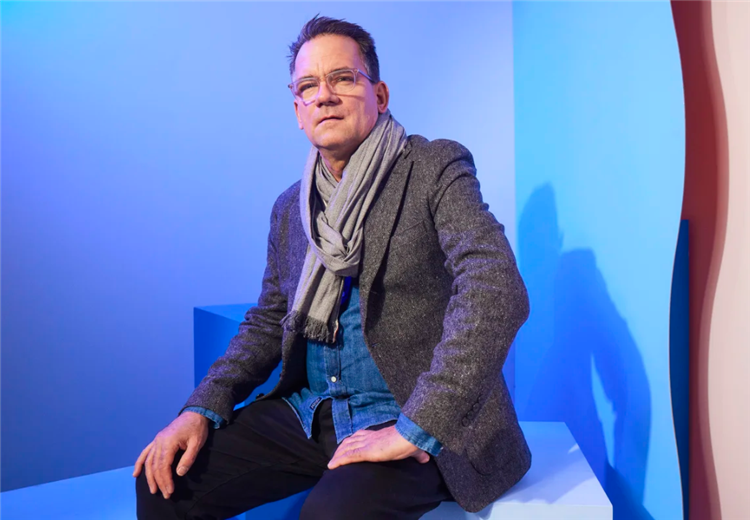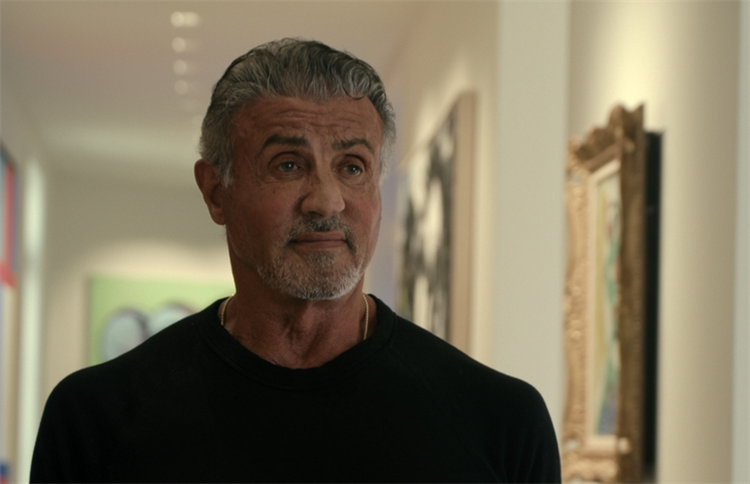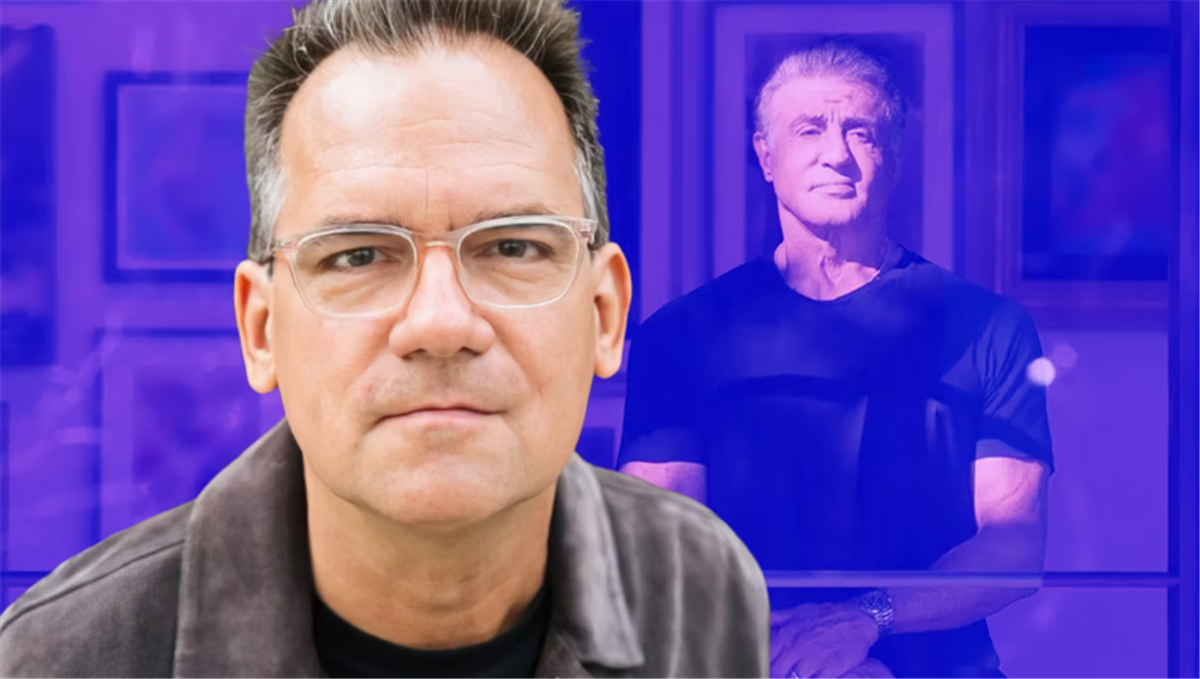Director Thom Zimny discusses what it was like interviewing Sylvester Stallone as well as his favorite movie starring the Hollywood icon.
Much like his big screen alter ego, Rocky Balboa, Sylvester Stallone’s rise to fame is the ultimate underdog story, and it makes you believe in the American Dream. Now streaming on Netflix is Sly, a documentary film where the Oscar nominee opens up about his success, his family, and all the obstacles he overcame. It’s a deeply personal film, and it feels authentic to Stallone himself. It’s rare to see Hollywood legends like Stallone become so vulnerable, yet that’s exactly what happens in this documentary.
Thom Zimny, the director behind the documentary, is no stranger to crafting biographical documentaries. He’s a frequent collaborator of Bruce Springsteen, having directed the music icon in various music videos and concert films. He’s also made documentaries focusing on Willie Nelson, Elvis Presley, Johnny Cash, and most recently Pierce Brosnan. Long story short, Zimny has had quite a career thus far.
Collider was lucky enough to sit down and talk with Zimny about making the documentary, what it was like working with Stallone, the best Stallone movies, and much more.
When my boss was looking for someone to do this interview, I jumped to it because I am a massive Stallone fan. I work next to a poster for the first Rocky, so I was just like, “I have to do this.”
THOM ZIMMY: Oh, great.
I wanted to ask, who came to who first with this? Did you go to Stallone or did Stallone come to you?
THOM ZIMMY: I first got on to the Sly doc by getting called by Braden Aftergood, who’s Sly’s producer with Balboa Productions. He’s been with Sly for a long time, and he introduced me to the idea of doing a documentary about Sylvester Stallone. Braden had seen a film that I had made called Western Stars with Bruce Springsteen and he really liked that film and thought that it had a cinematic look and dealt with the subject in an interesting way, of Bruce’s life and an album, Western Stars, so they were interested in talking to me. Then, the next thing is, I met Sly in LA and that led to a conversation with Sly where we came into his office and his office was full of memorabilia, and I immediately knew that this is the way I wanted the film to feel, this feeling of Sly standing before you telling you his life story, and also being surrounded by all this imagery. Like you described, you have a poster, Sly had all these props from all the different films and Oscars, and you have the full, rich cinematic history of Sly. But I really wanted to get at a story that went past the iconic version of Sly and get at the artist, the artist on a journey. So, spending time with him and having these conversations, I was able to unpack his life in a way that hopefully gives the viewer and the super fan like yourself this opportunity to feel like you know more and to look at the work differently.

How much of this did you have a structure planned out? I know he opens up about a lot with his father and everything, and a lot of that really caught me by surprise.
ZIMMY: Well, the beauty of working on this film was I had basic research, but every time I interviewed Sly, I came to a place of understanding more – more details of his childhood, more details of his motivation and making it, the struggles that he had. So, I was prepared for the job, but nothing prepared me for what he was willing to give me, and nothing prepared me for the details of his father. You know, as a filmmaker, you hope to find these moments, and you hope to have somebody stand before you and give you an honest take on their experience and their relationships with parents and the industry and work and family; Sly went beyond that. He really would spend six/seven hours with me talking about all of it in an honest and truthful way. That’s the greatest gift you get as a filmmaker is time and trust.
I know the documentary talks a lot about Sly, not just as an actor but also as a writer and a director. I know Bruce Springsteen co-directed with you before. I wanted to know, Sly, was he involved with the post-production and everything with this, and how heavily involved?
ZIMMY: Sly’s involvement was just the interviews. He never gave me anything of any direction on what the film should have, what it couldn’t say, or what topics we couldn’t go near. I screened the film for him a couple of times, and the only thing that he ever did was give me more imagery to work with. There was no notes, there was no discussion of holding back on a certain theme or an idea or something. He really gave me the freedom to create a story, and that was a great honor because I respect him so deeply as a screenwriter and also an editor and filmmaker, but he gave me the space to tell this story, and in it, his collaboration with me was the space of talking and unpacking his life.
So you were saying that he had a couple of ideas for different footage that he gave you? One of my favorite shots in this documentary is just at the beginning, where it shows Sly and he’s just watching Rocky and he’s watching Rambo.
ZIMMY: The imagery of Sly watching his own movies came from him visiting my edit room. Sometimes I would project the films, and in between editing, I would watch certain scenes. I suggested to him that he drop by and I do an interview. The film shows clips of him watching not only Rocky and Rambo and some of the other films but also some of the films that influenced him, like The Lion in the Winter. All those interviews took place in my edit room, where I would cover the space with photographs, lines that I liked, imagery, and a timeline of his life to understand it, what films he had made. So I didn’t really build the film in a traditional linear way, but I would keep all that information in my edit room, and it actually served as a bit of a prop for him to be able to walk around and tell his life story and also refer to the board, and say, “I made this film here, and I did this film there.” But Sly watching his movies came from visiting in the edit room.
Do you have a personal favorite Stallone movie?
ZIMMY: Every month it changes, [and] I find myself falling in love with a new film. Cop Land I go to a lot. It’s a great, great film, and the tonal qualities of that film have always stayed with me. I have a deeper understanding of it now that I realize what Sly did to put himself in that role, and also I have a deeper appreciation of it because he didn’t rely on the physicality that he had from other characters like, in the early ‘80s, the Rambo or the Rocky character being very physical. By the time you get to the place of Cop Land, it’s the complete opposite, so how he challenges himself as an actor, as a writer, in his life is completely inspiring, but I don’t have one film that sums up my love of Stallone’s cinematic work. Like a song, I find myself going to different films at different times.
Speaking of Cop Land, that’s the movie I just watched for the first time earlier this year, and I loved it. I was kind of caught off guard by how, in the documentary, he was reflecting on some of the negative reception of the movie. I had to look it up afterward, and I was kind of shocked. So I was wondering if him opening up about some of his failures as an artist, were you ever caught off guard or surprised by what he had to say?

ZIMMY: There’s many times that in discussion with Sly, when he was discussing his body of work, he came to this place of honesty. In Stop! Or My Mom Will Shoot or Rhinestone, he had this great thing of being able to laugh at himself in some of those choices, but also moments of explaining what he was thinking about in it. I was really taken by his love of Cop Land in that scene that he describes; that was a great surprise. But whenever I was discussing the films, he would always find something that I just never read about, or I was just surprised that he felt that way. That’s part of the beauty of the interview process is that you can go back to these things again and again and get to a place where he’s talking about it in a deep way, and it’s not just a soundbite that says it’s a good film. You know, Cop Land held a lot of promise, but it didn’t make it, and that continues the theme of Sly not being understood or appreciated. Hopefully, this doc is going to turn that, and people will see him as an artist and see the body of work differently.
Did you ever feel like he or even you were nervous opening up about some of the things that he does? Especially, I keep going back to what he talks about with his dad. Most of the time, celebrity documentaries are like, “Oh, look how great I am,” or things like that, but this was very vulnerable.
ZIMMY: Sly, in my first initial meeting, mentioned his father and how that relationship shaped a little bit of writing the Rocky character, and in the way that he stood, and that gave me a clue that Sly had this relationship with his father that was troublesome, but also, I knew that I wanted to be in the space of talking about these things honestly. I related to them, and the theme of a lost father is in my other bodies of work where the Johnny Cash story has an element of that, Bruce Springsteen’s lyrics have conversations about his relationship with his father, and that is a theme that runs in my films. So, stepping into that space, stepping into that wheelhouse, I felt like was a doorway into looking at Sly’s work because all the work unpacks his life, the good, the bad, and the difficult. When you look at the character of Mickey being such a mentor, it suddenly changes when you have a grasp and an understanding of Sly’s childhood. And I didn’t fear those questions because they came from a place of not being salacious but wanting to know the artist’s journey. There’s a difference between a story about the father just being tough or a question that frames it in the POV of, “How did this affect the man, the adult, the artist?” So, I tried to stay in that space and just relied on what Sly was giving me because there were a lot of things that were unprovoked, and he just would tell me stories about some of the difficulties with his dad.
In the documentary, I wasn’t as surprised to see Arnold [Schwarzenegger] there or Talia Shire, but there are some of them, like Wesley Morris, I was shocked to see him. I was especially shocked to see [Quentin] Tarantino there. I just read his book a few months ago, and he talks a lot about Sly in there, but how did you get some of those people involved with this?
ZIMMY: Finding the right voice is a really important thing for me when I’m making these films. Who’s gonna have a voice next to Sylvester Stallone, and who’s going to be believable, and who’s going to be able to demonstrate what Sly was doing, which is truth and an experience with the work, an honest experience of the work? So I stayed away from celebrity, stayed away from voices that would just be repeating the theme of Sly’s greatest Sly, and got to the place of Wesley or Tarantino because they had the effect of Sly changing their life. They saw his films, and things were not the same. Tarantino brought out the details of Sly’s impact on cinema, the details of Sly’s writing. He was able to discuss the filmmaker that I wanted to get at, and what better voice than Quentin Tarantino?
I’m really grateful for the time that these people spent with me because they flesh out the story that Sly is driving. Also, Talia was amazing in what she shared of her experience making Rocky and the other films with Sly, but also the man returning to the man. I think Quentin was great in just talking about it from a fan’s point of view – seeing Rocky for the first time, seeing the crowd cheer, the importance of that moment, what it felt like then, and also the rise to fame that Sly had. So, I’m really grateful for all those voices. I think they are in sync and in tune with Sly’s narrative in such a way that you just believe it, and they make the journey that much more enjoyable because they’re coming at it from all different points of view – fan, writer, cinephile.
